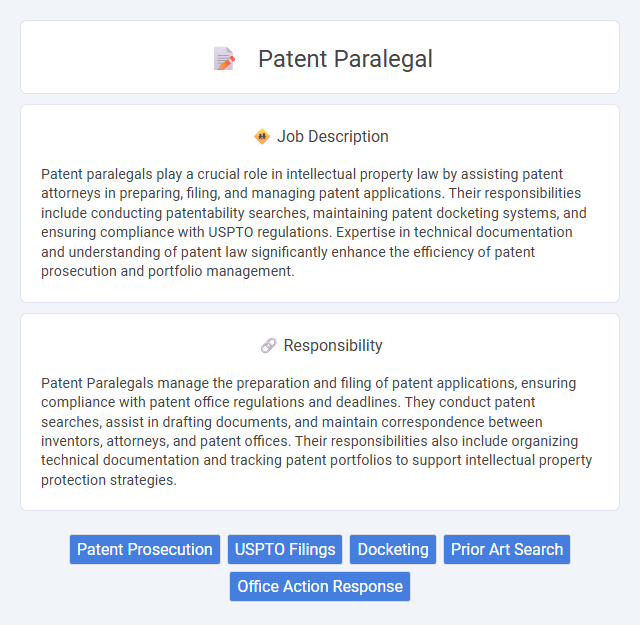
Patent paralegals play a crucial role in intellectual property law by assisting patent attorneys in preparing, filing, and managing patent applications. Their responsibilities include conducting patentability searches, maintaining patent docketing systems, and ensuring compliance with USPTO regulations. Expertise in technical documentation and understanding of patent law significantly enhance the efficiency of patent prosecution and portfolio management.
Individuals who possess strong attention to detail and enjoy working with technical documents may be well-suited for a Patent Paralegal position. Those with a background or interest in science, engineering, or law could have a higher probability of success in this role. Candidates who thrive in structured environments and have good organizational skills might find the responsibilities of managing patent applications and conducting legal research suitable for their capabilities.
Qualification
A Patent Paralegal typically requires a bachelor's degree in science, engineering, or technology fields such as biology, chemistry, or computer science to effectively understand patent specifications and technical documents. Proficiency in intellectual property law, patent prosecution processes, and familiarity with patent databases like USPTO or EPO is essential for drafting and managing patent applications. Strong research, organizational skills, and attention to detail are crucial qualifications to support patent attorneys in preparing legal documents and ensuring compliance with patent office regulations.
Responsibility
Patent Paralegals manage the preparation and filing of patent applications, ensuring compliance with patent office regulations and deadlines. They conduct patent searches, assist in drafting documents, and maintain correspondence between inventors, attorneys, and patent offices. Their responsibilities also include organizing technical documentation and tracking patent portfolios to support intellectual property protection strategies.
Benefit
Patent Paralegal roles likely offer significant benefits such as enhanced expertise in intellectual property law and increased career advancement opportunities within the legal and technology sectors. Candidates may gain valuable experience working with patent applications, contributing to innovations and protecting client assets, which could improve job security and professional growth. Access to specialized training and a collaborative work environment might further boost job satisfaction and long-term earning potential.
Challenge
A Patent Paralegal role likely involves navigating complex intellectual property laws and managing extensive documentation, which can present significant challenges. The probability of encountering tight deadlines while coordinating with inventors, attorneys, and patent offices may require strong organizational skills and attention to detail. Balancing technical knowledge with legal procedures could be a demanding aspect of the position.
Career Advancement
A Patent Paralegal plays a crucial role in intellectual property law by assisting patent attorneys in preparing and filing patent applications. Career advancement opportunities often include progressing to Senior Patent Paralegal roles or specializing in complex patent prosecution and litigation matters. Gaining expertise in patent office procedures and technology areas enhances prospects for leadership positions within law firms or corporate IP departments.
Key Terms
Patent Prosecution
Patent Paralegals specializing in patent prosecution manage the preparation, filing, and tracking of patent applications, ensuring compliance with USPTO rules and deadlines. They assist patent attorneys by conducting prior art searches, preparing office action responses, and maintaining patent dockets for efficient case management. Expertise in patent law, technical documentation, and USPTO submission processes is crucial for success in patent prosecution roles.
USPTO Filings
A Patent Paralegal specializing in USPTO filings manages the preparation, review, and submission of patent applications, ensuring compliance with USPTO rules and deadlines. They coordinate communication between inventors, patent attorneys, and the USPTO, track application status, and assist with office action responses. Expertise in patent filing procedures and understanding of USPTO electronic filing systems like EFS-Web are essential for efficient patent prosecution.
Docketing
Patent paralegals specializing in docketing manage the timely tracking of patent application deadlines, office actions, and maintenance fees using sophisticated IP management software. Their role ensures compliance with USPTO deadlines by meticulously updating docketing systems to prevent costly oversights in patent prosecution processes. Accurate docketing supports patent attorneys in meeting critical timelines, enhancing patent portfolio management and legal accuracy.
Prior Art Search
Patent paralegals specializing in prior art search systematically analyze existing patents, scientific literature, and technical documents to identify relevant information that may affect patentability. Their expertise in patent classification systems, databases such as USPTO and WIPO, and advanced search tools ensures thorough and precise retrieval of prior art. Accurate prior art search supports patent attorneys in drafting strong applications and defending intellectual property rights against infringement.
Office Action Response
A Patent Paralegal specializing in Office Action Response plays a crucial role in drafting and submitting detailed replies to patent examiners' objections and rejections during the patent prosecution process. Expertise in USPTO rules, patent claim analysis, and technical documentation is essential to ensure accurate, timely responses that advance patent applications. Collaborating closely with patent attorneys, these paralegals help maintain patent portfolios and secure intellectual property rights for clients.
 kuljobs.com
kuljobs.com